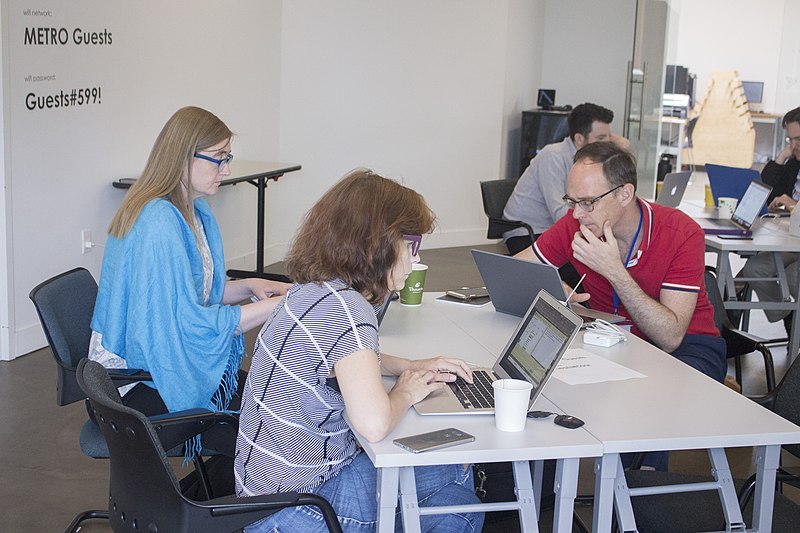“Contributing content to Wikidata has a ripple effect. It’s a great way for libraries to contribute our resources to a wide variety of communities and meet users where they already are. It also presents opportunities to facilitate a community’s involvement in, design of, and creation of information.” – participant of our July 2019 Wikidata workshop
In July, we hosted our first Wikidata workshop, bringing together librarians from across the New York City Metro area. The “Alexa-friendly world of Wikidata,” as Wired Magazine calls it, is growing in popularity. Several library organizations (including the PCC, IFLA, and most recently, ARL) have published documents identifying Wikidata as a powerful tool for libraries. So what exactly is Wikidata? And why would 15 people hang out with us at the Metropolitan New York Library Council (METRO) to learn more about it?
Wikidata is the structured, linked data repository for all Wikimedia projects. It is a language-agnostic platform that allows volunteer editors from all over the world to create structured data to describe items on Wikimedia projects and beyond. Wikidata also offers a powerful query service that lets users visualize and consume this data in endless ways.
The goal of our workshop (and our online courses) is to provide the background new editors need so they can work with Wikidata with confidence and accuracy. We also provide an overview of Wikidata policies and its community, and create opportunities to incorporate Wikidata into organizational work across industries and disciplines. At this workshop our group reviewed specific editing demonstrations (how to edit references, create statements, and add qualifiers for example), and then had opportunities to put their new skills to work by contributing new information to Wikidata. For many of these participants, this was their first time working on a Wikimedia project!

As with all our professional development courses, we hope to foster collaboration and allow participants to support each other as they learn to contribute.
As one participant said “Adding and editing content in Wikidata can raise the prominence of factual knowledge and improve the visibility of marginalized groups and knowledge.” Wikidata not only has the power to surface information that doesn’t exist outside of library catalogs, but it also has the power to amplify the reach of existing collections through Wikipedia and digital assistants (like Siri and Alexa) which employ Wikidata’s structured data to answer questions.
At the end of the workshop one of the participants summed it up perfectly: “Contributing to Wikidata has a ripple effect […]. It’s a great way for libraries to contribute our resources to a wide variety of communities and meet users where they already are. It also presents opportunities to facilitate a community’s involvement in, design of, and creation of information.”
Get involved
If you’re a librarian interested in learning more about…
- creating linked data,
- applying linked data,
- mapping items from one catalog to another,
- using identifiers on Wikidata, and/or
- understanding how Wikidata can help surface knowledge
…then join one of our Wikidata courses this fall! We have courses for beginners as well as for anyone familiar with linked data or Wikidata. Register before September 9th for our September-October courses, and before October 1st for our October-November courses. Hope to see you!
Not a librarian? Wikidata is still relevant!
If you’re not a librarian – don’t worry – Wikidata is useful to almost any discipline! Several museums have recently started open data initiatives which are appearing on Wikidata in some really cool ways. And this is just the tip of the iceberg. Beyond museums, many governments – federal, state level, and local – have excellent open data portals that could be used to enrich Wikidata with more information about congressional districts, elections, and issues that matter to voters. That information would feed directly into Wikipedia and digital assistants (like Alexa and Siri), answering voters’ questions where they’re asking them. With all of this data out there, there’s no shortage of things we could do with Wikidata!
If you’re interested in enrolling 10 or more participants from the same institution in an online course OR bringing one of our Wikidata specialists to your campus for an in-person workshop, email data@wikiedu.org for course buy-out and other customized options.
Special thanks to METRO, Wikimedia-NYC, and the Data Science Institute at the University of Virginia, as well as our guests Megan Wacha (president of Wikimedia-NYC) and Lane Rasberry (Wikimedian-in-Residence at the Data Science Institute at the University of Virginia) for your help with the event. You can check out all the work we accomplished here.
